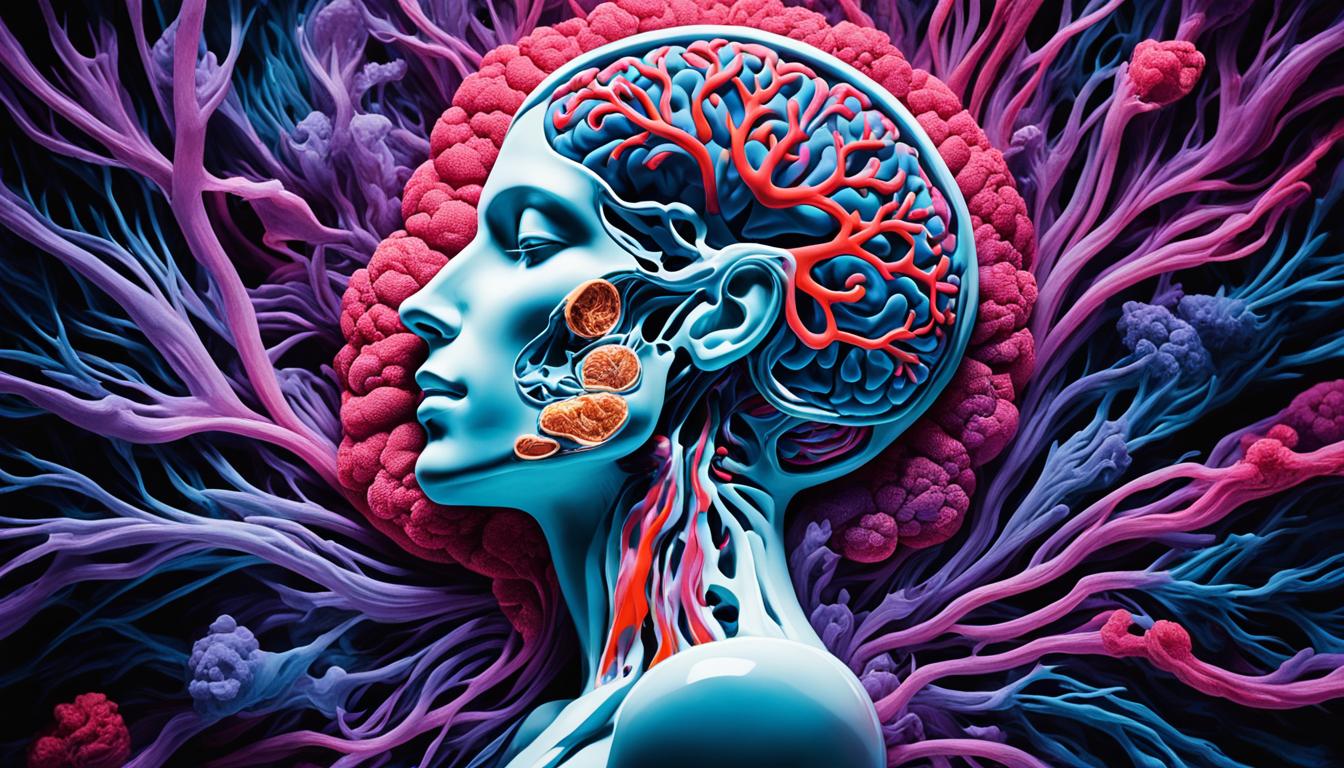Hypersexual disorder, known as nymphomania, is when someone has way too many sexual thoughts and acts. This can lead to a lot of problems in their life. They might watch a lot of porn, masturbate a lot, get paid for sex, or have sex with many different people. Some people think of this as being addicted to sex, but it’s not an official diagnosis.
If someone is dealing with depression, high anxiety, or problems in their relationships, they might want sex all the time to cope. While it’s not in the main book that lists mental illnesses, it was once thought to be a problem if it caused a lot of distress.
People with hypersexuality can get help through talking with a therapist or taking certain medications.
Key Takeaways:
- Hypersexual disorder, also known as nymphomania, involves excessive sexual thoughts and behaviors.
- Compulsive sexual behavior disorder has been recognized as a legitimate condition by the World Health Organization.
- Possible causes of hypersexuality include anxiety, depression, and relationship conflict.
- Hypersexuality can be distressing and impair various areas of an individual’s life.
- Treatment options for hypersexuality include psychotherapy and medication.
Signs and Symptoms of Hypersexuality
Hypersexuality, also known as nymphomania, shows different signs in different people. It’s key to know these signs to spot and deal with the condition. Here are some things you might see in a person with hypersexuality:
- Compulsive Sexual Behavior: People might act on sexual urges without thinking. This includes watching a lot of porn, touching themselves, and having many sex partners.
- Uncontrollable Sexual Fantasies: They may have sexual thoughts that happen again and again. These thoughts might get in the way of daily life.
- Difficulty in Relationships: Having healthy relationships is hard for those with hypersexuality. Their strong sexual desires can be too much for partners to handle.
- Inability to Control Sexual Urges: They can’t stop themselves from acting on their sexual needs. This can cause problems in their personal and work lives.
- Engaging in Sexual Behaviors Despite Harmful Consequences: Even if they know the dangers, they might keep up risky sexual behavior. This includes actions that could hurt them or others.
Having a high sex drive is not the same as hypersexuality. Hypersexuality involves strong, uncontrollable sex urges. We still don’t completely understand what causes it. But, things like epilepsy, brain chemical imbalances, and certain drugs seem linked. People with a past of substance abuse, family mental health issues, or sexual abuse may be more at risk.
It’s important to handle hypersexuality with understanding and get help from professionals. Recognizing the signs is the first step to finding the right help.
Diagnosis and Treatment Options for Hypersexuality
Diagnosing hypersexuality is tough. There’s no exact guide in the Diagnostic and Statistical Manual of Mental Disorders. Yet, experts might look at addiction or impulse control rules to check for it.
Treating hypersexuality mixes drugs and talking with a therapist. Drugs like mood stabilizers and antidepressants can lower the need for sex. They also fix any brain chemical problems. This makes drugs a good way to control hypersexuality by aiming at its causes.
Therapy is also key, using methods like CBT or psychodynamic talk. It helps people dig into why they act that way and find new ways to deal with their feelings. This can be very helpful for understanding and managing the problem.
It’s not okay to feel bad about having hypersexuality. Getting help from someone who knows sexual issues is important. They can offer the right tests and help make a plan to treat it.
So, diagnosing hypersexuality is hard. But, experts adapt from other rules to spot it. Treating it often mixes drugs and therapy, with meds targeting biological causes. Therapy helps in digging deeper and learning to respond in better ways.
Treatment Options Overview
Here is a quick recap of treatment options for hypersexuality:
| Treatment Options | Description |
|---|---|
| Medication |
Doctors might give mood stabilizers and antidepressants to cut down on sex drive and balance brain functions. |
| Psychotherapy |
Therapy, including CBT and talk sessions, aims to understand and manage the root causes of overactive sex drive. |
Remember, the right treatment plan varies. It depends on different factors. Working closely with healthcare experts is key to finding the best solutions.
Conclusion
Hypersexuality, or nymphomania, means thinking and acting on sex too much. Many experts debate sex addiction, but they agree compulsive sexual behavior is real. It has been listed as a disorder by the World Health Organization. People with hypersexuality can find their life hard to live normally, affecting work, school, and relationships.
There are ways to treat this condition, like talking to a therapist or taking medicine. Psychotherapy helps you learn to control your behavior and think differently. You can also take drugs that help with mood or stop the urge to have sex. These methods aim to make life better for people with hypersexuality.
New treatments, like stem cell therapy, are also being studied. These could fix the body’s systems that cause hypersexuality. As we learn more, stem cell therapy might offer hope for a better life for those affected.
It’s important to remember that help is available if you or someone you know has hypersexuality. You’re not alone in this, and there are many treatments that can make things better.

